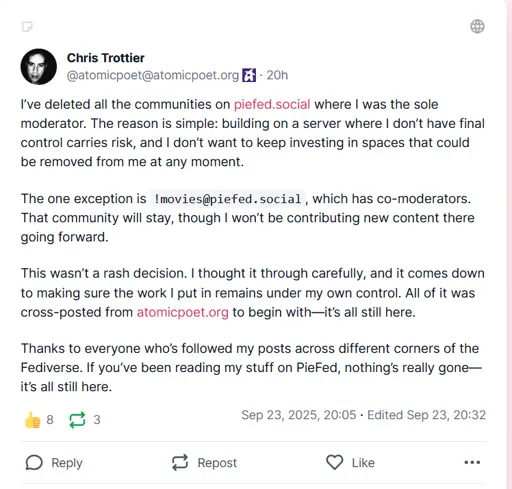Yeah, I get why the word “own” makes people uneasy. There’s a sincere belief that communities should belong to the commons—that no one should control the space, that it should be shared, stewarded, collective.
I sympathize with that. I really do.
But that’s not how the software works.
Lemmy isn’t structured like a commons. Neither is Mastodon. Neither is most federated software. These platforms still rely on admins, moderators, and users. There are hierarchies, permissions, access levels. Someone has root. Someone pays the bills. Someone can click “ban.”
If you’re building a community on someone else’s server, you are doing so inside their infrastructure. And under the law, they are the legal operator and data controller. That gives them full authority—technical and legal—over the domain, the storage, the moderation tools, and the continued existence of what you built.
So yes—everything you post on Reddit, Facebook, or Twitter lives behind walls. Even if you retain copyright, you’ve handed over a perpetual license to do whatever they want with it. They own the platform. They control the archive. You’re not publishing. You’re donating.
The Fediverse is better—but let’s not pretend it’s structurally different. If you build something inside someone else’s instance, they own the keys. If they kick you out, it’s gone. That’s not a glitch. That’s the model.
If you truly want a commons—a system with no admins, no mods, no hierarchy—you need to build software that works that way. But that’s not Lemmy. Not Mastodon. Not Misskey. Not PeerTube.
In this system, the only real recourse is to run your own server. That’s where your power begins. That’s where your autonomy lives.
And that’s why I say: I want to own my community.
Because if I don’t, someone else will. And I’ve seen what happens when they do.

